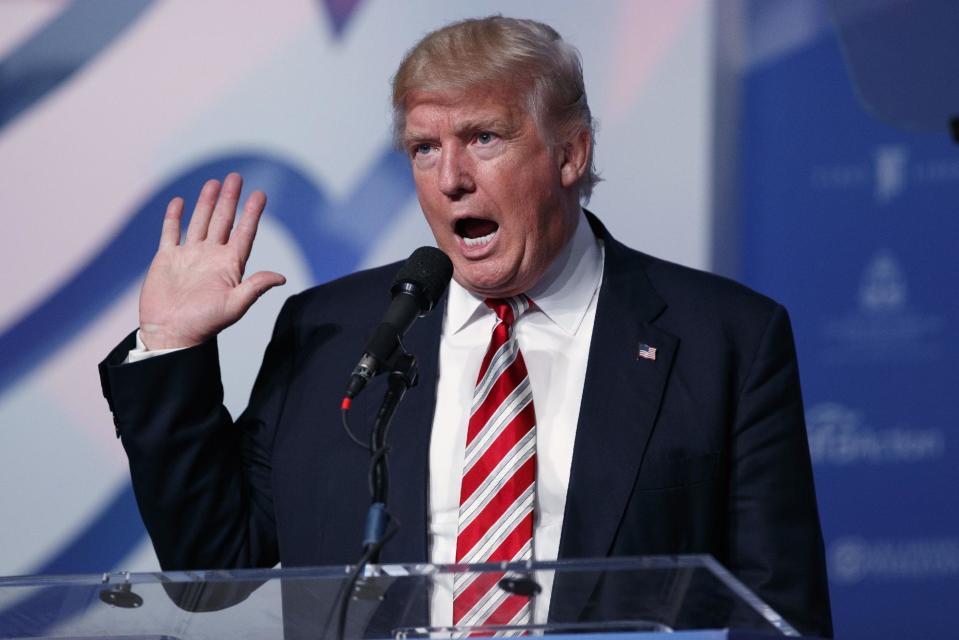‘Lock her up!’ yell Christian conservatives, as Trump addresses Values Voters Summit
What a difference a year makes.
At the 2015 Values Voter Summit, the annual gathering of conservative Christians held in Washington, D.C., Donald Trump finished a distant fifth place in the straw poll vote of GOP candidates — far behind overwhelming favorite Ted Cruz, as well as Ben Carson, Mike Huckabee and Marco Rubio. Unaccustomed to speaking before religious audiences, Trump made a few stumbles and drew boos when he referred to Rubio as a “clown.”
On Thursday, he returned to the confab hosted by the Family Research Council, but now as the Republican presidential nominee and the event’s main attraction. Trump addressed the packed ballroom at D.C.’s Omni Shoreham Hotel, where he answered the question of what you get when you cross a combative, coarse reality-show star with a group of conservative values voters. Enthusiastic chants of “Lock her up!” filled the room in the middle of Trump’s speech, only to be replaced by earnest applause minutes later as he read from the New Testament: “No one has ever seen God, but if we love one another, God lives in us and His love is made complete in us.”
It was head-spinning, but of a piece with the rest of Trump’s appearance. As is his wont, the nominee toggled back and forth between the scripted speech on the teleprompter and his extended ad-libbed riffs, most notably about the IRS regulation that prevents churches from engaging in political activity if they want to maintain tax-exempt status.
The so-called Johnson Amendment has been in place since 1954, and it — along with the question of who will shape the U.S. Supreme Court through future appointments — has formed the root of Trump’s appeal to evangelical voters. The idea that pastors are being silenced fits in well with his warnings about the tyranny of political correctness, and Trump often becomes especially animated when he touches on the subject.
Before the Values Voter audience, Trump went even further than usual, declaring that if “pastors and ministers … want to talk about Christianity, if they want to preach, if they want to talk about politics, they are unable to do so.” He continued, “All religious leaders should be able to freely express their thoughts and feelings on religious matters.”
Of course, that’s exactly what religious leaders do on a weekly, if not daily, basis. But even just limiting concern to clergy’s ability to engage in political activity, for Trump’s characterization to be accurate, you’d have to set aside nearly all of Martin Luther King Jr.’s work, the arrests of clergy protesting nuclear weapons, the arrests of clergy protesting abortion, Pat Robertson’s presidential campaign and all the religious leaders who have spoken at numerous Trump rallies and events, including the 2016 Republican National Convention.

In reality, the Johnson Amendment limits only those clergy who want to use their churches as political arms — and even then, it’s virtually never enforced. No matter. When Trump promised the crowd, “I will repeal the Johnson Amendment if I am elected your president,” he was rewarded with cheers and applause.
That response apparently puts Values Voter Summit attendees in the minority of evangelicals, three-quarters of whom say that they don’t want pastors making endorsements from the pulpit, according to a recent survey from LifeWay Research, a Nashville-based Christian research organization. “Americans already argue about politics enough outside the church,” LifeWay executive director Scott McConnell told Christianity Today. “They don’t want pastors bringing those arguments into worship.”
During his speech, Trump softened his usual harsh remarks against refugees, perhaps because of the role many evangelical congregations have played in welcoming and settling Syrian refugees. And he touched on a few issues, like Supreme Court appointments and homeschooling, that are of special interest to conservative evangelicals.
It was near the end of Trump’s remarks, however, that the true affinity he shares with many in the conservative Christian community became crystal clear. After lecturing the crowd for not voting in large enough numbers in 2012 and implying that his defeat in November could only happen if they failed to turn out at the polls, Trump focused on the shared disrespect he and evangelicals have endured from “liberal elites.”
“These people — they think we’re stupid. They think we’re stupid,” he said, to loud cheers of agreement. “Well, they won’t be thinking it for long.”

